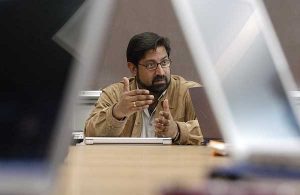Dhavan Shah – Director
 Dhavan Shah, Director of the Mass Communication Research Center, is the Jack M. McLeod Professor of Communication Research and Louis A. and Mary E. Maier-Bascom Chair in the School of Journalism and Mass Communication at the University of Wisconsin-Madison, where he is also Research Director of the Center for Communication and Civic Renewal.
Dhavan Shah, Director of the Mass Communication Research Center, is the Jack M. McLeod Professor of Communication Research and Louis A. and Mary E. Maier-Bascom Chair in the School of Journalism and Mass Communication at the University of Wisconsin-Madison, where he is also Research Director of the Center for Communication and Civic Renewal.
His focus on the intersecting power of framing and social capital has shaped his three major lines of research on (1) the influence of message construction and processing on social judgments, (2) the communication dynamics shaping civic and political participation, and (3) the role of online interactions in chronic disease management. This work has generated six coauthored and coedited books, 200 articles and chapters, and collaborative grants totaling over $62 million from private foundations (ADL, Hewlett, Knight, Tow) and federal governments (NRF Korea, NIH, NSF).
Within the MCRC, Shah works with fellow faculty and graduate students in three research collaboratives: (1) Center for Communication and Civic Renewal (CCCR), (2) Health Information Technology Studies (HITS), and (3) Social Media and Democracy (SMAD). Articles from these collaborations appear in leading communication, political science, health informatics, and medical journals (see research section). The center and its research infrastructure also support other faculty and student research collaborations that span a range of research groups, conceptual frameworks, and methodological approaches to communication research. With affiliated appointments in Industrial and Systems Engineering, Marketing, and Political Science, Shah brings together faculty from across campus, combining conventional and computational social science approaches to study politics and public health and translate research insights into scalable systems and solutions.
UW-Madison awarded Shah the Maier-Bascom Chair in 2006 and a WARF Named Professorship in 2023. He received his Ph.D. in Mass Communication with a minor in Political Psychology from the University of Minnesota in 1999.
Sijia Yang – Associate Director
 Sijia Yang, Associate Director of the Mass Communication Research Center, is an Associate Professor in the School of Journalism and Mass Communication at the University of Wisconsin-Madison, where he directs the Computational Approaches and Message Effects (CAMER) research group. His research program on health message effects centers around three integrated foci: social-message dynamics, studying the effects of persuasive appeals on social processes (e.g., message sharing, intergroup conflicts, online commenting) and how they may in turn influence message processing and outcomes; computational message science, examining the roles of algorithms and machine learning in persuasive messaging, not only as algorithmic communicators (e.g., bots, ChatGPT), but also as emerging methods (e.g., structural topic modeling, causal machine learning) to facilitate studying message effects in the hybrid media system; and multimodal message intervention, designing and implementing effective message-based interventions (e.g., warning labels, online campaigns) to address pressing public health challenges, particularly those faced by vulnerable communities (e.g., vaccine promotion in rural areas).
Sijia Yang, Associate Director of the Mass Communication Research Center, is an Associate Professor in the School of Journalism and Mass Communication at the University of Wisconsin-Madison, where he directs the Computational Approaches and Message Effects (CAMER) research group. His research program on health message effects centers around three integrated foci: social-message dynamics, studying the effects of persuasive appeals on social processes (e.g., message sharing, intergroup conflicts, online commenting) and how they may in turn influence message processing and outcomes; computational message science, examining the roles of algorithms and machine learning in persuasive messaging, not only as algorithmic communicators (e.g., bots, ChatGPT), but also as emerging methods (e.g., structural topic modeling, causal machine learning) to facilitate studying message effects in the hybrid media system; and multimodal message intervention, designing and implementing effective message-based interventions (e.g., warning labels, online campaigns) to address pressing public health challenges, particularly those faced by vulnerable communities (e.g., vaccine promotion in rural areas).
This work has generated over $9 million in collaborative extramural grants from federal governments and private foundations such as NSF, CDC, the Knight Foundation, and Poynter, including an NSF Convergence Accelerator award where Yang serves as a co-principal investigator.
Within the MCRC, Yang is a core faculty member for the Center for Communication and Civic Renewal (CCCR) and the Heath Information Technology Studies (HITS) group, frequently collaborating with other MCRC fellows, faculty participants, and graduate students on topics related to computational communication science, health communication, and digital media. This collaborative work has produced publications in top peer-reviewed journals and conference proceedings in communication, public health, and computational social science. Yang is also a faculty affiliate with the UW-Madison Prevention Research Center and a frequent collaborator with researchers in UW School of Medicine and Public Health and UW Institute for Clinical and Translational Research, where he brings expertise in health message effects to develop and evaluate community-engaged health interventions. Yang’s work has received recognition from the field, including a Top Poster Award from the Association for Education in Journalism and Mass Communication in 2023, the 2020 Abby Prestin Dissertation award from the Health Communication Divisions of ICA and NCA as well as the Top Paper Award from the Health Communication Division of ICA that same year. UW-Madison has awarded him the Exceptional Service Award in 2022 and the Terry Hynes Innovative Leadership Award in 2023 to recognize his service for the department, the university, and local communities. He received his Ph.D. in Communication from the Annenberg School for Communication at the University of Pennsylvania in 2019.
Chris Cascio – Associate Director

Chris Cascio, Associate Director of the Mass Communication Research Center, is an Associate Professor in the School of Journalism and Mass Communication at the University of Wisconsin-Madison, where he is also the Research Director of the Communication, Brain and Behavior Lab.
Cascio uses tools from communication neuroscience and social neuroscience to understand when and how persuasion and social influence work. Specifically, his research focuses on neurocognitive mechanisms associated with social influence and persuasive messages delivered through mass media, social media, and interpersonal communication to better understand subsequent behaviors. His research aims to: 1) understand the core mechanisms that drive behavior change in response to social influence and persuasive messages; 2) incorporate traditionally unexplored contextual factors, like how personality characteristics, situational social context (e.g., being in the presence of a risky versus safe peer), socio-demographic contextual factors (e.g., high versus low socioeconomic status (SES)), and human development (e.g., adolescents versus young adults) moderate neural mechanisms associated with social influence and persuasion; and 3) show how intervention strategies (e.g., self- affirmations, health warning labels) alter neural mechanisms associated with social influence and persuasion, and how these changes relate to behavior change.
This research is supported by grants from the Eunice Kennedy Shriver National Institute of Child Health and Human Development (NIH-NICHD) and University of Wisconsin-Madison totaling over $8 million.
Within the MCRC, Cascio works with interdisciplinary faculty, post-docs, graduate, and undergraduate students in the Heath Information Technology Studies (HITS) group, Center for Communication and Civic Renewal (CCCR), and Communication Brain and Behavior Lab (CBB). This research has led to publications in leading journals, including the Proceedings of the National Academy of Sciences, Journal of Marketing Research, Journal of Adolescent Health, Developmental Cognitive Neuroscience, Social Cognitive and Affective Neuroscience, Communication Methods and Measures, Scientific Reports, and Current Opinions in Behavioral Sciences. This research has also gained recognition from popular outlets such as the Washington Post, New York Magazine, Discover Magazine, and Businessweek.
Cascio received his Ph.D. in Mass Communication from the Annenberg School for Communication at the University of Pennsylvania in 2017.